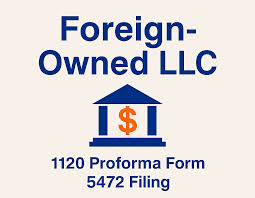Understanding U.S. Tax Rules for Foreign-Owned LLCs
The United States is known for its complex tax regulations, especially for entities owned by foreign individuals or companies. One such entity is the Limited Liability Company (LLC), which is a popular choice among foreign investors due to its flexible structure and benefits. However, owning an LLC in the U.S. comes with significant tax responsibilities that foreign owners need to be fully aware of to remain compliant and avoid severe penalties.
This article will explore the U.S. tax laws that apply to foreign-owned LLCs, focusing on reporting requirements, applicable tax forms such as Form 5472 and Form 1120, penalties for non-compliance, and the importance of proper legal assistance in navigating these rules.
What Is a Foreign-Owned LLC?
A foreign-owned LLC is a Limited Liability Company established under U.S. state laws, but where one or more of its members are non-U.S. persons or entities. Due to the pass-through tax nature of LLCs, all income, deductions, and credits typically flow to the members' personal tax returns. However, the treatment differs for foreign owners, especially in terms of reporting and withholding obligations.
Key U.S. Tax Reporting Obligations for Foreign-Owned LLCs
Foreign owners of U.S. LLCs face stringent reporting requirements regardless of whether the LLC operates at a profit or experiences losses. The U.S. Internal Revenue Service (IRS) mandates that these LLCs must report specified information annually to ensure transparency and prevent tax evasion.
Two critical forms are involved in this process: Form 5472 and Form 1120. Failure to file these forms timely and accurately can lead to significant penalties, making it essential for foreign-owned LLCs to understand and comply with these rules.
Form 5472: Report of a 25% Foreign-Owned U.S. Corporation or a Foreign Corporation Engaged in a U.S. Trade or Business
Form 5472 is used to disclose certain reportable transactions between a foreign-owned U.S. LLC and its foreign owner or other related parties. The form must be filed with a pro forma Form 1120, even if the LLC has no income, expenses, or tax liability. This form helps the IRS monitor transactions that may involve transfer pricing or profit shifting.
Importantly, starting in 2017, the IRS expanded the filing requirements of Form 5472 to include disregarded entities that are wholly owned by foreign persons, which covers many foreign-owned LLCs. As a result, such LLCs must maintain detailed records of reportable transactions and file Form 5472 annually to avoid penalties.
Form 1120: U.S. Corporation Income Tax Return
Although LLCs are typically treated as pass-through entities, for the purpose of filing Form 5472, foreign-owned single-member LLCs are required to file a pro forma Form 1120. The IRS considers these LLCs as corporations solely for reporting purposes to facilitate the attachment and processing of Form 5472.
Even if the LLC has no income, deductions, or tax liability, failing to submit this form along with Form 5472 constitutes a failure to file Form 5472 and can trigger penalties.
Penalties for Non-Compliance
The IRS imposes severe penalties for failure to comply with Form 5472 filing requirements. Specifically, the penalty for each failure to file or incomplete filing is $25,000 per year. If the failure continues for more than 90 days after IRS notification, additional penalties may accrue, further increasing the financial burden on the foreign owner.
These penalties apply regardless of whether the LLC had profits, as the obligation to file is independent of income. Therefore, even inactive foreign-owned LLCs must comply annually to avoid these costly fines.
Recordkeeping Requirements
Alongside filing requirements, foreign-owned LLCs must keep meticulous records of all reportable transactions with their foreign owners or related parties. These records include documentation of sales, purchases, rents, royalties, and other financial transactions that may be scrutinized by the IRS.
Proper documentation supports the entries on Form 5472 and is essential in the event of an IRS audit or examination. Incomplete or inaccurate records can lead to increased scrutiny, extended audits, and penalties.
Why Compliance Costs Less Than Penalties
While the compliance process involving preparation and filing of Form 5472 and Form 1120 may seem daunting and potentially expensive, it is crucial to recognize that the penalties for non-compliance are substantially more severe. A single missed form can cost a foreign owner $25,000 or more per year, and these penalties multiply quickly if multiple forms go unfiled or if the failure remains unresolved.
Investing in professional tax consultation and compliance services early can save substantial money and prevent legal complications down the line. It ensures that foreign-owned LLCs fulfill their U.S. tax obligations while focusing on their business growth.
Common Challenges Faced by Foreign-Owned LLCs
- Understanding whether their LLC classification requires filing of Form 5472 and Form 1120.
- Navigating the complex instructions and schedules associated with these forms.
- Maintaining detailed and compliant transaction records with related foreign parties.
- Meeting filing deadlines and responding to IRS notices timely.
- Determining tax treaty benefits and how they apply to LLC income.
- Avoiding inadvertent errors that could lead to penalties or audits.
How Legal and Tax Professionals Can Assist
Given the complexities involved in U.S. tax reporting for foreign-owned LLCs, seeking the assistance of experienced legal and tax professionals is highly advisable. Experts can provide guidance on entity classification, ensure accurate and timely filings, assist with documentation, and offer strategic tax planning to optimize tax outcomes.
Additionally, professionals can represent clients in communications with the IRS, manage responses to inquiries or audits, and help implement corrective actions if the entity falls behind in compliance.
Case Study: Avoiding Penalties Through Proper Compliance
Consider a foreign-owned LLC engaged in e-commerce with no annual profits due to reinvestment strategies. Despite zero profit, the LLC had to file Form 5472 and Form 1120 every year. Initially unaware of this obligation, the LLC failed to file, leading to IRS penalties of $25,000 per missed year.
After consulting with a tax attorney specializing in cross-border taxation, the LLC organized its recordkeeping and resumed timely filings. The professional assistance led to the negotiation of penalty abatement with the IRS based on reasonable cause and compliance history, substantially reducing fines.
This example underscores the importance of understanding filing requirements and securing expert help to avoid costly penalties.
Important Filing Deadlines
Foreign-owned LLCs must be particularly mindful of IRS deadlines to avoid penalties:
- Form 5472 and pro forma Form 1120 are generally due by the due date of the LLC’s income tax return, including extensions. For calendar year entities, this is typically April 15, with possible extensions to October 15.
- All required information and supporting documentation should be prepared well in advance to meet filing deadlines.
- Failure to request an extension timely or missing the extended date leads to automatic penalties.
Summary of Filing Requirements
- Foreign-owned single-member LLCs disregarded for tax purposes must file Form 5472 and pro forma Form 1120 annually.
- Reportable transactions with foreign owners and related parties must be fully documented and reported.
- Timely filing and accurate completion of forms are critical to avoid $25,000-per-year penalties.
- Maintaining proper records supports compliance and audit defense.
- Professional guidance significantly reduces compliance risk.
Why Foreign Investors Choose LLCs in the U.S.
LLCs are preferred by many foreign investors due to their flexibility in management, limited liability protection, and pass-through taxation benefits. However, these advantages come with the responsibility of understanding the special IRS filing requirements imposed on foreign-owned entities.
The ability to shield owners from personal liability while enjoying operational simplicity makes LLCs attractive. Yet, non-compliance with reporting can jeopardize these benefits through heavy fines and potential legal scrutiny.
Staying Updated on Regulatory Changes
U.S. tax laws and IRS regulations are subject to updates. For instance, changes implemented in 2017 expanded Form 5472 filing to previously exempt entities. Compliance demands ongoing attention to current rules affecting foreign-owned LLCs.
Therefore, foreign investors must stay informed or work with advisors who monitor legislative changes to ensure continuous compliance.
Final Thoughts on U.S. Tax Compliance for Foreign-Owned LLCs
Owning an LLC in the U.S. as a foreign person involves more than just business operations—it requires meticulous adherence to tax reporting obligations. Form 5472 and Form 1120 filings are foundational components of this compliance.
Because omissions carry hefty penalties, it is financially prudent and legally necessary for foreign owners to fulfill these requirements annually, even when their LLCs do not realize profits.
With proper planning, legal guidance, and attention to detail, foreign owners can confidently navigate U.S. tax regulations, mitigate risks, and capitalize on the benefits of operating LLCs within the U.S. jurisdiction.
Legal Marketplace Consultant is committed to providing comprehensive support for foreign investors navigating the complexities of U.S. tax laws applicable to foreign-owned LLCs. Our team of experts, including tax attorneys, accountants, and legal consultants, ensures that your filing and compliance requirements are met accurately and timely.
Understanding and adhering to IRS reporting obligations such as Forms 5472 and 1120 protects your business from costly penalties and legal challenges. We recommend reaching out to professionals for tailored guidance and support.
Legal Marketplace Consultant specializes in comprehensive legal and tax services for foreign-owned LLCs in the U.S. Our expertise spans tax compliance, entity formation, and regulatory advisory to help you succeed in the American market.































